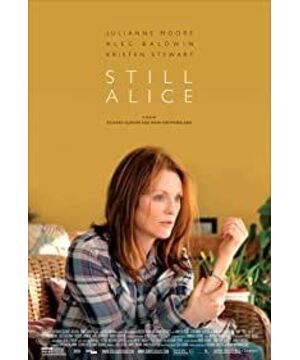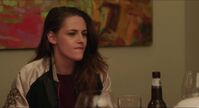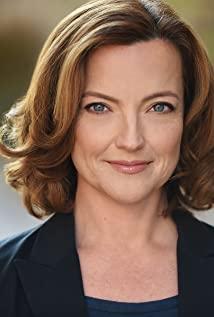Everything that happens in the universe is just right, there is meaning to death and aging, and that's the art of loss.
The famous American poetess Elizabeth Bishop once said, "The art of losing is not difficult to master, and many things are more meaningful after they are lost, and it is not unfortunate." I'm not a poet, I'm just an ordinary person who just watched the movie "Still Alice".
"Still Alice" is a movie about Alzheimer's disease. Alice, played by Julianne Moore, is a well-known Columbia University linguistics professor who was diagnosed early at the age of 50 with hereditary Alzheimer's disease Alzheimer's disease (aka Alzheimer's). She began to forget. At first, it was just trivial things such as names and words. It gradually developed into getting lost while running, forgetting the agreed meal, and the people she just met. Later, she put the shampoo in the refrigerator and forgot for a few seconds. What Zhong said... She has a husband and three children who love her very much. The Alzheimer's Association's introducer said that "her family supports her with love and care."
Let me talk about a few moments in the film that left a deep impression on me.
The first is that when the doctor suspected that Alice had Alzheimer's disease, Alice was reluctant to accept it and concealed it from her family. But when she couldn't sleep late one night, Alice, who finally couldn't hold back, told her husband the news. The husband could not accept it, and has been in extreme denial. Alice broke down and said "I know how I feel, can you take this seriously! I feel like my brain is dying, what I've wanted to work on my whole life is disappearing, it's over !" When faced with difficulties that cannot be solved by oneself, "denial" is an important part of the self-defense mechanism. This kind of denial from people close to them seems to be extremely unsupportive to the patient himself. You are not her and you will never be able to empathize with others, so it is extremely important to respect your own thoughts.
Second, Alice and her husband complained "I wish I had cancer so at least I wouldn't be ashamed. People would wear pink ribbons for those who have cancer, they would march for you, they would be for you Raise money, and you don’t need to socialize like that.” We often feel that Alzheimer's patients are lucky compared to cancer because they don't have to experience physical pain and heavy medical bills. But because of this popular opinion, cancer patients are far more concerned than other neurological/psychiatric diseases such as Alzheimer's. The pain suffered by the latter on the psychological and spiritual level is no less than the physical pain. It is unfair to say that no one is more fortunate than the other in misfortune.
The third is that Alice mentioned in her speech "I am not suffering, I am struggling." Living in the moment, as well as the passage read aloud by the youngest daughter Lydia at the end, "Living in the world is a painful process, nostalgia. Holding on to what is left behind, but dreaming of the future.” Thanks to the miniatures of the characters in the film, we outside the screen can experience what we may experience in the final stage of life, and learn this kind of perception of life and life in advance. Living in the moment, the four big characters are clearly stated, but few people can really live clearly.
But the part of the whole movie that got me thinking the most was about Alice's suicidal intent.
Alice visits a nursing home for Alzheimer's patients alone after learning that her condition may deteriorate rapidly. The material conditions of the sanatorium are good, but because of the restrictions of the disease, the lives of many patients appear to be "miserable". Because she didn't want her life to end at such a stage, Alice decided to write down simple basic questions in the mobile phone memo, such as what is the name of the eldest daughter, what month is her birthday, etc., and attached at the end "If you can't answer these any more. problem, open the butterfly folder in the computer". In the folder is a video recorded at the beginning of the diagnosis, introducing himself to himself, and instructing himself to take a lot of powerful sleeping pills to commit suicide. Later, because of an opportunity, Alice, who was in the advanced stage of her illness, just opened this video and gradually tried to end her life according to her own wishes. But at the last moment of the suicide process, the nanny came back, Alice scattered the sleeping pills in a panic, and the suicide failed.
The movie just used a "just right" to save Alice's life. What if Alice had succeeded in killing herself? Although the family members will have short-term grief, as Alice mentioned in her speech, living without knowing who she is and where she is now is undoubtedly hell for her, so she helps herself to escape Hell, could there be a better ending? Do people have the right to decide their own life or death when they are rational and sober? It is better to die than to live, is it really a universal truth?
View more about Still Alice reviews











